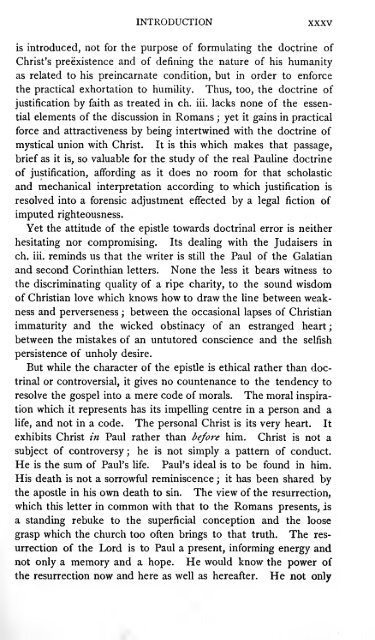Philippians and Philemon - MR Vincent - 1906.pdf
Philippians and Philemon - MR Vincent - 1906.pdf
Philippians and Philemon - MR Vincent - 1906.pdf
You also want an ePaper? Increase the reach of your titles
YUMPU automatically turns print PDFs into web optimized ePapers that Google loves.
INTRODUCTION XXXV<br />
is introduced, not for the purpose of formulating the doctrine of<br />
Christ's preexistence <strong>and</strong> of defining the nature of his humanity<br />
as related to his preincarnate condition, but in order to enforce<br />
the practical exhortation to humility. Thus, too, the doctrine of<br />
justification by faith as treated in ch. iii. lacks none of the essen-<br />
tial elements of the discussion in Romans ; yet it gains in practical<br />
force <strong>and</strong> attractiveness by being intertwined with the doctrine of<br />
mystical union with Christ. It is this which makes that passage,<br />
brief as it is, so valuable for the study of the real PauHne doctrine<br />
of justification, affording as it does no room for that scholastic<br />
<strong>and</strong> mechanical interpretation according to which justification is<br />
resolved into a forensic adjustment effected by a legal fiction of<br />
imputed righteousness.<br />
Yet the attitude of the epistle towards doctrinal error is neither<br />
hesitating nor compromising. Its dealing with the Judaisers in<br />
ch. iii, reminds us that the writer is still the Paul of the Galatian<br />
<strong>and</strong> second Corinthian letters. None the less it bears witness to<br />
the discriminating quality of a ripe charity, to the sound wisdom<br />
of Christian love which knows how to draw the line between weak-<br />
ness <strong>and</strong> perverseness ; between the occasional lapses of Christian<br />
immaturity <strong>and</strong> the wicked obstinacy of an estranged heart<br />
between the mistakes of an untutored conscience <strong>and</strong> the selfish<br />
persistence of unholy desire.<br />
But while the character of the epistle is ethical rather than doc-<br />
trinal or controversial, it gives no countenance to the tendency to<br />
resolve the gospel into a mere code of morals. The moral inspira-<br />
tion which it represents has its impelling centre in a person <strong>and</strong> a<br />
life, <strong>and</strong> not in a code. The personal Christ is its very heart. It<br />
exhibits Christ in Paul rather than before him. Christ is not a<br />
subject of controversy ; he is not simply a pattern of conduct.<br />
He is the sum of Paul's life. Paul's ideal is to be found in him.<br />
His death is not a sorrowful reminiscence ; it has been shared by<br />
the apostle in his own death to sin. The view of the resurrection,<br />
which this letter in common with that to the Romans presents, is<br />
a st<strong>and</strong>ing rebuke to the superficial conception <strong>and</strong> the loose<br />
grasp which the church too often brings to that truth. The res-<br />
urrection of the Lord is to Paul a present, informing energy <strong>and</strong><br />
not only a memory <strong>and</strong> a hope. He would know the power of<br />
the resurrection now <strong>and</strong> here as well as hereafter. He not only<br />
;





